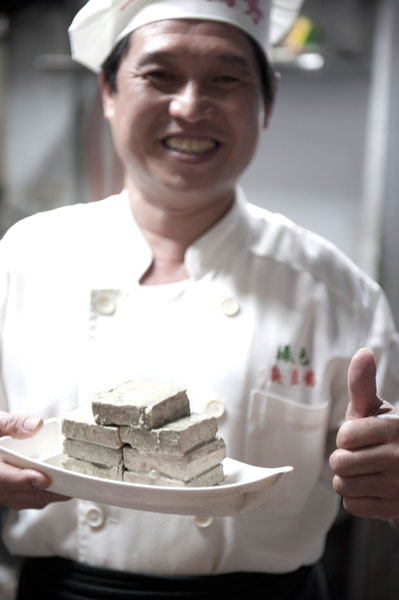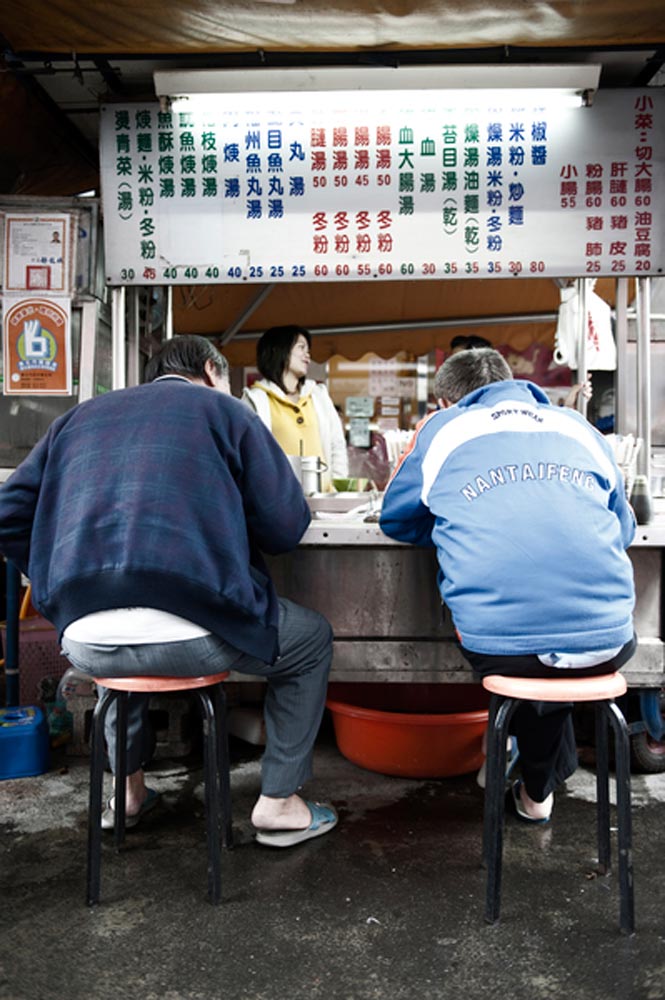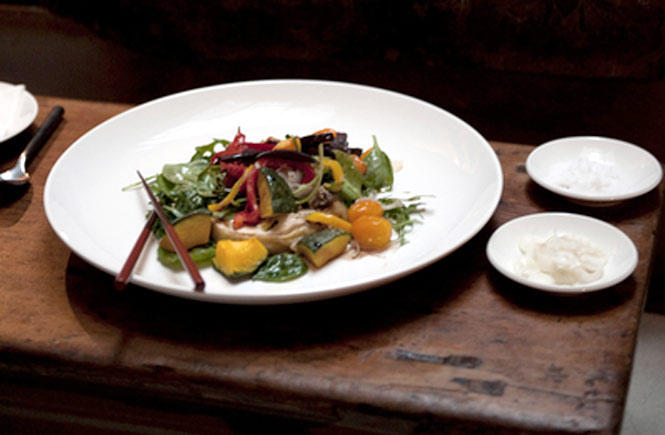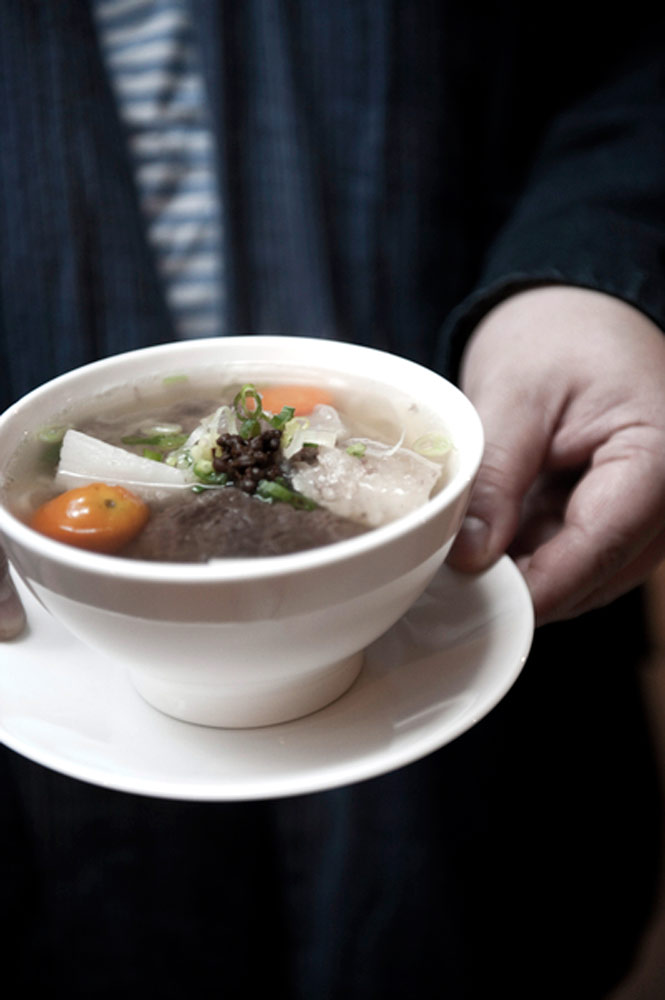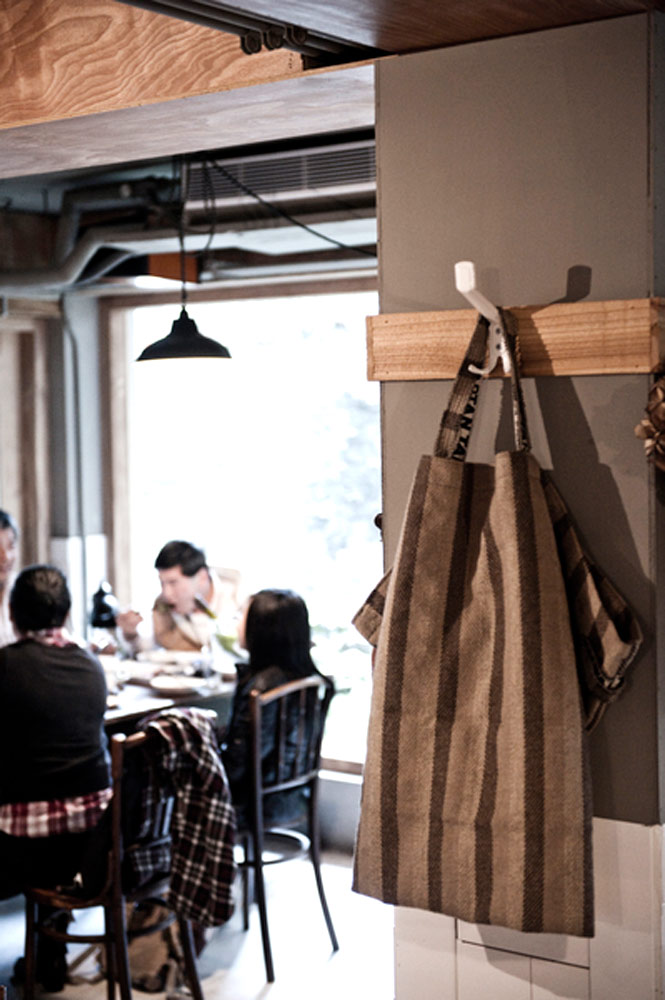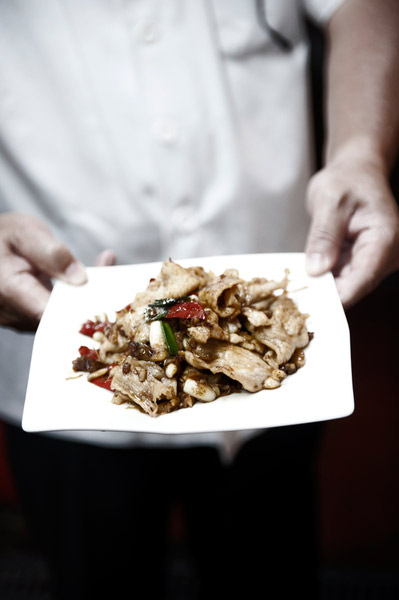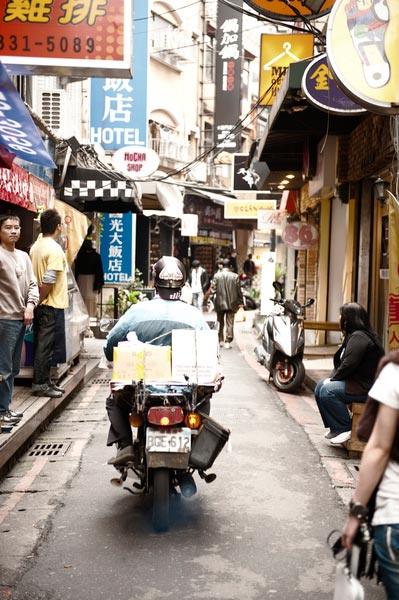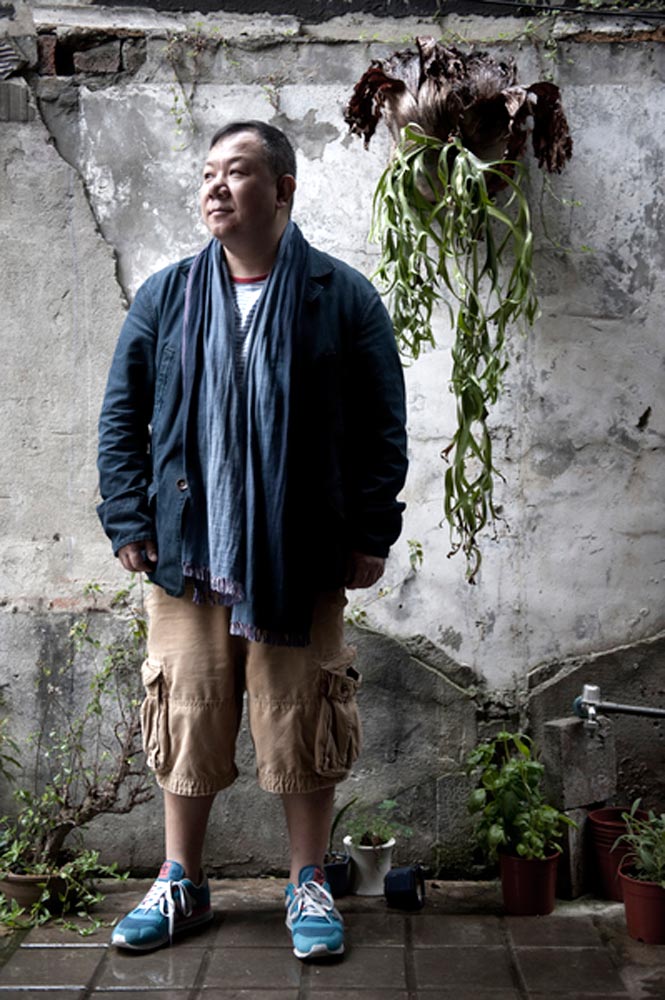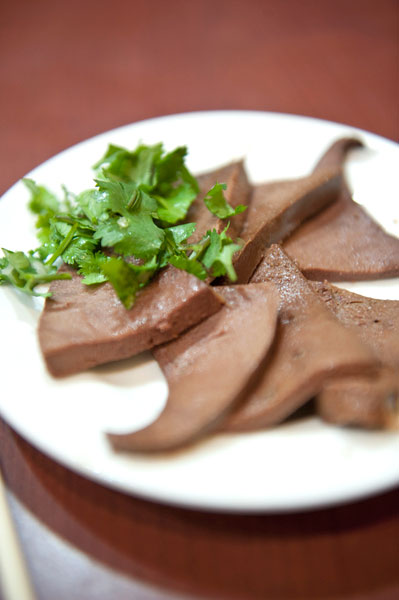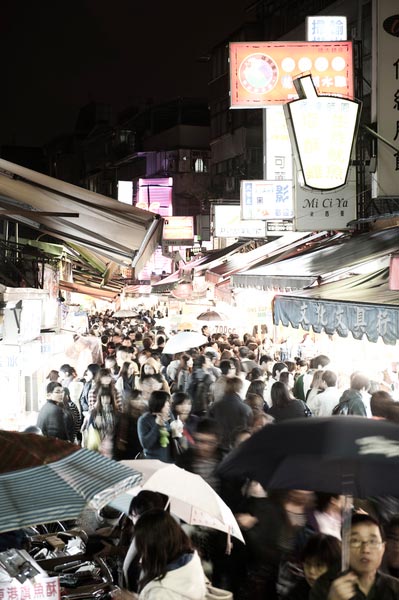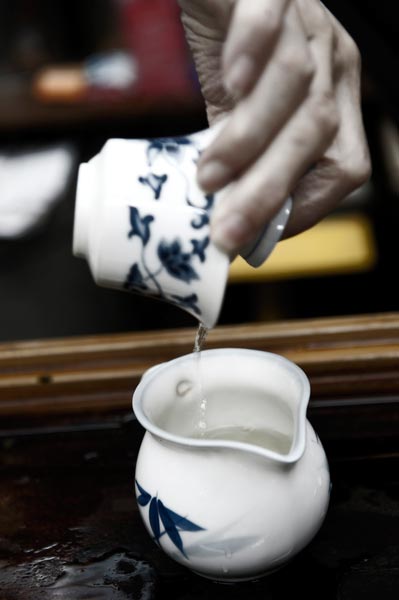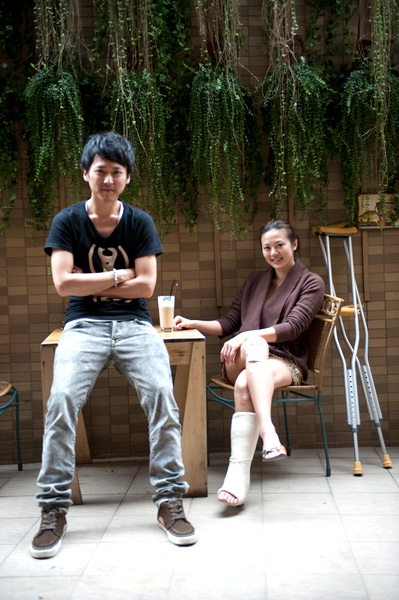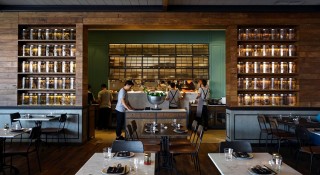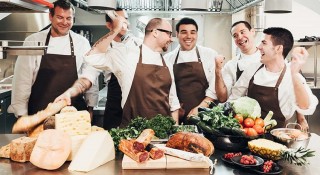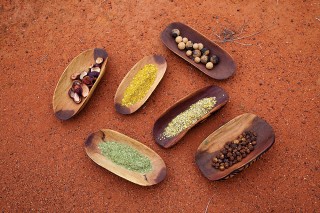I asked her if family-run places like this would survive Taipei’s modernizing streak. “I hope so, because I don’t want it to change too much more. Taipei hasn’t lost its flavor yet, and that’s what makes it special.”
Later that night I returned to the street for another bowl of oyster noodles, but it was swallowed up in the chaos of a blinking, flashing night market. The street, dead quiet only hours before, was filled with steam, sweat, and the smell of Chinese five-spice. I got drawn in to the hungry current, and was swept past Tung Fah without even noticing.
Rarely do food conversations blow my mind. But then, I don’t usually sit down at a bar next to a middle-aged Taiwanese pop star with an affinity for single-malt Scotch and the ancient chemistry of eating. “Crabs and eggplants—they’re deadly if eaten in the wrong way!” Bobby Chen was expounding. “But there are ways around it, like putting garlic in the eggplant and basil with the crab. Then it won’t kill you.” I furrowed my brow and did my best to play along. “You don’t believe me! It’s like ducks listening to thunder, trying to talk to foreigners about Chinese food.” (Apparently ducks are unmoved by thunderstorms, and float obliviously through them.) Chen then launched into a disquisition about the merits of his favorite vegetable, loofah, a tropical gourd known here as si gua. He told me that the absolute best were grown on the Penghu Islands, off Taiwan’s western coast. Then he wiggled his tongue and laughed heartily, but I didn’t get the joke, and it was getting late. “There is a very short window for getting si gua, just like when you meet a woman,” Chen explained with a straight face. “And if you eat it fresh and it’s a long and skinny one, and it’s cooked just right … it will remind you of a woman’s tongue.” As the bar broke out in laughter, Chen promised to prove this to me the following night.
I arrived at Jin Ping Xuan with Chen and a small entourage of friends, which included his female bodyguard, a martial-arts expert. As the dishes arrived at our table in rapid succession, she proceeded to knock back shots of a very fine Scotch. In Taiwan, she told me, “no one drinks alone,” meaning I was expected to follow her lead. After several snaps of the wrist, I began to hope the gods of rare single malt weren’t watching.
The food at this modern Shanghainese eatery was excellent, which was something I was getting used to. Taiwan seems to grow better produce than China, and its restaurants weren’t smothered as China’s were during the darkest days of Mao. We devoured perch steamed with mustard leaves, and pork belly slowly stewed into a gelatinous slab of sweet, fatty, ridiculous richness. Then the chef made his way to our table.
“There are no si gua today,” he told Chen with regret. “The typhoon wiped out the entire crop.” But there was more whisky, so we ordered another bottle and lingered late into the night.
When one thinks of Taipei and food, one’s mind might drift to the city’s well-documented night markets. But night markets in Taipei are a sort of catchall experience: you buy cheap jeans, test your luck in carnival games, and eat squid on a stick, often all at once. Market food is designed for portability, and it’s as often disappointing as delicious. But there are exceptions to the rule, and the food at the Shida Night Market is one of them.
Shida crawls with local college students, and is a sort of street cafeteria where everything from gua bao (steamed buns stuffed with braised pork) to “stinky” fermented (Continued on page 132) (Continued from page 100) tofu can be found. Mi fen tang—a rice-noodle soup traditionally served with stewed innards and a flurry of white pepper—is a staple here, too. I ate a bowl of it on the way to my next restaurant. The intestine was tender but crisp, the tofu filled with flavorful stock. It was marvelous.
Yi Chi Du Xiu lies in an alley at the rear of the market. Its name is a play on an ancient Chinese verse that says “One flower makes a scene of early spring”; the restaurant’s moniker cheekily suggests that one bite of the food here will have the same effect. But one whiff of the inside of this place might send you running, because it’s redolent of the pungent funk of a feedlot.
Stay. Because Yi Chi Du Xiu specializes in two things: crunchy chou dofu (the aforementioned stinky tofu) and silky slices of poached pig liver, both of which were among the best things I ate in Taipei. The tofu, unlike a ripe French cheese, bears little resemblance in your mouth to how it appears on the plate. It’s crisp and has a sharp, savory smokiness that compliments the spicy chili sauce alongside it.
And that Taipei standby—beef-noodle soup—is also a common sight in night markets and street stalls here. Yet the quality varies dramatically, and the city’s most storied noodle house, Taoyuan Street Beef Noodles, is not its best. For that, head to the rainbow tapestry of guavas, mangoes, and lychees in Chengzhong Market.
Chengzhong, in the historical core of Taipei, is home to a place called Laopai Niu Rou Lamian Da Wang (“Old Style Beef Noodle King”). The King sells dumplings and soups, but its hong shao niu rou mian, which is a chestnut-colored stock swimming with salty beef brisket and chewy wheat noodles, is definitely the main attraction. The stock, assertively seasoned with Chinese herbs, is complex; the beef falls apart at a chopstick’s pinch; and the thick strips of wheat dough are firm and chewy. Sit down, spoon pickled mustard greens atop your soup from lacquered bowls, and savor old Taipei.
“My grandfather was the chef to General Claire Lee Channault, leader of the Flying Tigers,” Chef Li Yao Wen told me as I slowly ate a spoonful of his superior stock, a soup so rich it had the consistency of gravy. “Then, my father moved to Taiwan in 1958, and became a chef in Xinmending.
He taught me all I know, and since then I’ve cooked for political figures and celebrities.”Li isn’t bragging. In fact, he’s exceedingly modest for such a good cook. His place, called Chef Li’s Private Restaurant, has just four tables, and it’s almost always full. The tasting menus range from Western riffs and staid Japanese classics to Taiwanese street food. In an elaborate meal, I ate everything from that extraordinary stock to shrimp poached in a light yellow curry, seared scallops with basil and tomato, and gooey Japanese mountain yam with bonito. The only thread that seems to connect his dishes is discipline—for superb technique and excellent ingredients.
On another quiet street in Taipei lies what might be the city’s most interesting eatery. The Four Senses, run by Calvin Chen, embodies a totally new direction in Chinese food. The space looks like someone’s apartment, albeit someone with exquisite taste. There are bookshelves, the odd antique, and the room is filled with cleverly curated warmth. The market menu —printed like an old Chinese grade-school examination paper—changes regularly. “The best market in Taipei is closed on Monday, so we are too,” Chen told me.
The food at the Four Senses is not fussy or forced. Instead, the kitchen finesses the best flavors out of rich stocks and vegetables. Well-heeled patrons eat blue taro braised with free-range chicken or Chen’s remarkably clear beef-noodle soup, while sipping Napa Cabernet out of stemless Riedel glasses.
And it all feels perfectly measured, a concept that looks outward for inspiration —to French bistros and Manhattan cafés —while training a devoted eye on serious Chinese cooking. When a bundle of edible flowers, lightly fried with olive oil and some sea salt, is placed on my table, I’m tempted to break out in joyous laughter. It’s unpretentious. It’s friendly. It’s creative. And it could only happen in a place called Taipei.
THE DETAILS:
Taipei
Getting There
Both Cathay Pacific (cathaypacific.com) and Singapore Airlines (singaporeair.com) operate multiple daily flights to Taiwan Taoyuan International Airport, which is about an hour’s drive from central Taipei.
Where to Stay
Located next door to the towering Taipei 101 building, the Grand Hyatt Taipei (2 Songshou Lu, Xinyi; 886-2/ 2720-1234; taipei.grand.hyatt.com; doubles from US$160) is the city’s premier five-star address. Alternatively, check in to the city’s newest boutique hotel, Hotel Éclat (370 Dunhua Nan Lu, Da-an; 886-2/2784-8888; eclathotels.com; doubles from US$172), where extravagant touches include two Salvador Dali sculptures and an Andy Warhol original.
Where to Eat
- Chef Li’s Private Restaurant
17 Rende Lu, Section 3; 886/937-056-628. - Four Senses
No. 18, Jinan Lu, Section 3; 886-2/8771-9191 - Jin Ping Xuan
18 Hengyang Lu, Section 2; 886-2/2388-5880 - Laopai Niurou Lamian Da Wang
Chengzhong Market, No. 7, Lane 46, Chongqing Nan Lu, Section 1; no telephone - Rong Rong Yuan
No. 9, Lane 102, Anhe Lu, Da-an, Section 1; 886-2/2703-8822 - Ya Rou Dian
98 Zhongde Lu, Section 2; 886-2/2371-3918 - Yi Chi Du Xiu
Shida Night Market, Lane 38, Taishun Lu, Section 1; 886-2/8369-2905 - Zhong Fu Yuan
106 Huaining Lu, Section 1; 886-2/2371-4933

